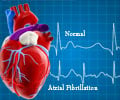The AI model could be of substantial assistance to individuals facing sporadic AFib episodes, offering advantages through timely diagnosis and intervention.

Prediction of atrial fibrillation from at-home single-lead ECG signals without arrhythmias
Go to source) The model picks up on tiny variations in a person's normal heartbeat that signify AFib risk, which standard screening tests cannot detect.The findings, described in the journal npj Digital Medicine, used data on nearly half a million people who had each worn an electrocardiogram (ECG) patch to record their heart rhythms for two weeks -- a routine screening test for AFib and other heart conditions.
‘AI model could significantly aid individuals experiencing rare occurrences of AFib, providing potential benefits through diagnosis and timely intervention. #atrialfibrillation #irregularheartrhythm #AI’





An AI model then analysed this data to find patterns, other than AFib itself that distinguished people with AFib from those without.This new model holds the potential to better detect those who are at risk for AFib and ultimately prevent this heart condition's severe side effects, including stroke and heart failure. "With this new tool, we can better identify patients at high risk of AFib for further tests and interventions," said Giorgio Quer, Director of AI at Scripps Research Translational Institute and an assistant professor of digital medicine at Scripps Research."Long term, this can help drive the right resources to the right people and potentially reduce the incidence of stroke and heart failure," said Giorgio Quer. The irregular heartbeat due to AFib can cause blood to pool in the heart and form blood clots, which can then contribute to strokes.
AFib is also associated with an increased risk of heart failure or death.Importantly, the model remained accurate for both an older population, who are at higher risk of AFib, and people under the age of 55, who are at much lower risk and are usually excluded from general AFib screening.
"Patients with frequent AFib episodes can be identified easily with an ECG recorded over at least a week," said Giorgio Quer," said Giorgio Quer.
Reference:
- Prediction of atrial fibrillation from at-home single-lead ECG signals without arrhythmias - (https://www.nature.com/articles/s41746-023-00966-w.pdf)











